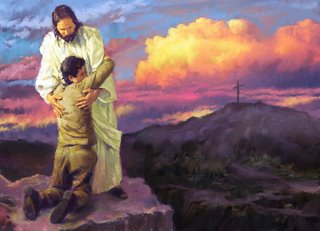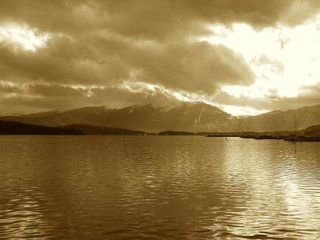 I know, I know...this is long. But if you have time, this sermon is so amazing. It's by John Piper. Please take a few minutes to rejoice with Piper at God's delight in His Creation.
I know, I know...this is long. But if you have time, this sermon is so amazing. It's by John Piper. Please take a few minutes to rejoice with Piper at God's delight in His Creation.
The Pleasure of God in His Creation
By John Piper
Psalm 104:31:
“May the glory of the Lord endure forever, may the Lord rejoice in His works.”
God delights in His Son. For all eternity God has been exuberantly happy in the fellowship of the Trinity. He has been overflowing with satisfaction as He looks out over the endless panorama of His own perfections reflected in the radiance of His Son's face.
Then we saw that one of the lessons to be learned from that divine happiness is that God is complete in Himself. He has no deficiencies. And therefore He can't be bribed with something He craves or blackmailed with some secret weakness or coerced by some superior power. And so all that He does, He does, not under constraint, but according to His own good pleasure. He is free, and He takes pleasure in all that He does.
Today we focus on one of the most astonishing things that God has done: He has created the universe, and what a universe it is! And there are two questions that I want to try to answer:
1. Does God take pleasure in His creation?
2. If so, why does He?
The first question I would answer with a resounding, "Yes!" God does take pleasure in His creation.
How do we know this? Genesis 1 describes for us not only the fact of an ordered creation by God, but also God's response to His creation. Five times, you recall, God stands back, as it were, and takes stock of His creation. Each time the text says, "And God saw that it was good" (vv. 4, 12, 18, 21, 25). And when all was finished and man and woman were created in His own image, it says, "And God saw everything that He had made, and behold, it was very good."
I take this to mean that God was delighted with His work. When He looked at it, it gave Him pleasure. He was pleased and happy with His creative effort.
Today's text, Psalm 104, is a song to express the joy God has in His creation. The key verse for our purpose is verse 31:
“May the glory of the Lord endure forever, may the Lord rejoice in His works.”
This is not a prayer for something that might not happen. The psalmist does not mean: "O, I hope God will rejoice in His works, but I am not sure He will." If that were the meaning then the first line of the verse would have to have the same sense: "O, I hope God's glory will endure forever, but I am not sure it will."
That is surely not what He means. The rock solid confidence of the whole Bible is that the glory of the Lord will not only endure forever but that it will cover the whole earth like the waters cover the sea (Numbers 14:21; Habakkuk 2:14).
The psalmist is not praying that an uncertainty might come to pass. He's exulting in a certainty that will come to pass. There is no doubt behind the shout, "May the glory of the Lord endure forever!" And there is no doubt behind the shout: "May the Lord rejoice in His works!"
So the answer to the first question is YES! God does take pleasure in His creation. He delights in the work of His hands.
Why Is This Important?
Now the question is, WHY? There are two reasons why this question is important to me.
1. One is that I feel compelled to explain why this pleasure God has in His creation is not an act of idolatry.
Why is this pleasure that God has in creation not a dishonor to the Son of God? Why shouldn't the Son be jealous? Should the Father really share His affection with the world? Should He not be totally satisfied in the beauty of His own perfections reflected back to Him in the person of His Son?
2. The other reason for asking why God delights in His creation is that we need to know this before the delight itself can tell us very much about God's character.
Two people can desire the same thing for such different reasons that one is honorable and the other is perverse.
Why God Takes Pleasure in His Creation
So for these two reasons at least let's try to answer the question why God takes pleasure in His creation. I'll try to sum it up in five statements based on this psalm and some other parts of Scripture.
These statements about why God delights in His creation are not really separate reasons because they overlap so much. But they each express a little differently the basic reason. So let's begin with the basic reason that seems to me to be right here in verse 31:
“May the glory of the Lord endure forever, May the Lord rejoice in His works.”
What this suggests to me is that the joy that God has in His works is owing to the fact that they are the expression of His glory. In other words, I think the two halves of this verse are related something like this: "As long as the glory of the Lord endures in His works, God will indeed rejoice in His works." Or you could say, "May the glory of the Lord endure for ever, so that the Lord may rejoice in His works." So my first and most basic, statement is that:
1. God rejoices in His works because His works are an expression of His glory.
This is what Psalm 19 makes very clear:
“The heavens are telling the glory of God; and the firmament proclaims His handiwork.”
So the most basic reason that God delights in His creation is that in creation He sees the reflection of His own glory, and therefore He is not an idolater when He delights in His work.
But what about the Son of God? Does this mean that the creation is in competition with the Son for the affection of the Father? Remember that the Son, too, is called the reflection of God's glory (Hebrews 1:3). Does God delight partly in the Son and partly in the creation? Does the creation rob the Son of any of the Father's delight? Should the Son be jealous of the creation?
No. Before creation the Father and the Son rejoiced in each other with overflowing satisfaction. And when the time came for creation the Bible says that both the Father and the Son were active in the work of creation (1 Corinthians 8:6; Colossians 1:16).
“In the beginning was the Word and the Word was with God and the Word was God. All things were made through Him and without Him was not anything made that was made.” (John 1:3)
In other words the work of creation is not merely the work of the Father as though He had to satisfy a need that the Son couldn't meet. Nor was creation merely the work of the Son as though He had to satisfy some need that the Father couldn't meet. Instead it was the work of both of them together.
And so when the Bible teaches that creation expresses the glory of God, we must not think merely of the glory of the Father or the glory of the Son, but rather the glory that they have together. And the glory that they have together is that overflowing mutual joy in each other's perfections. So creation is an expression of the overflow of that life and joy that the Father and the Son have in each other.
There is no competition or jealousy in the Godhead. The Son and Father are equally glorified in creation, because creation is the overflow of gladness that they have in each other.
So the first and most basic statement we can make about why God rejoices in His work of creation is that creation is an expression of His glory.
2. God rejoices in the works of creation because they praise Him.
In Psalm 148 the psalmist calls on creation itself to praise the Lord:
“Praise Him, sun and moon,
“praise Him, all you shining stars!
“Praise Him, you highest heavens,
“and you waters above the heavens!
“Let them praise the name of the Lord!
“For He commanded and they were created. . .
“Praise the Lord from the earth,
“you sea monsters and all deeps.” (vv. 3-5,7)
What does this mean? Well we might say that sun and moon and stars praise God by testifying to us about God. That would be true — that's what Psalm 19 says. But what about verse 7: "Praise the Lord you sea monsters and all deeps!"
One of my favorite poems is Elegy Written in a Country Churchyard by Thomas Gray in 1751. One of the stanzas says,
“Full many a gem of purest ray serene,
“The dark unfathomed caves of ocean bear:
“Full many a flower is born to blush unseen,
“And waste its sweetness on the desert air.”
Gray had been moved by the thought that on the bottom of the ocean there were beautiful gems that no human eye would ever see, and that in distant deserts millions of flowers would bloom, blush with vivid colors, give off a sweet fragrance and never be touched or seen or smelled by anybody — but God!
The psalmist is moved by the same thing it seems in verse 7: "Praise the Lord you sea monsters and all deeps!" He doesn't even know what is in all the deeps of the sea! So the praise of the deeps is not merely what they can testify to man.
It seems to me that creation praises God by simply being what it was created to be in all it's incredible variety. And since most of the creation is beyond the awareness of mankind (in the reaches of space, and in the heights of mountains and at the bottom of the sea) it wasn't created by merely to serve purposes that have to do with us. It was created for the enjoyment of God.
Ranger Rick arrives in our house. I open it and read about the European water spider that lives at the bottom of a lake, but breathes air. It does a somersault on the surface of the water and catches a bubble of air, and holds it over the breathing holes in the middle of its body while it swims to the bottom of the lake and spins a silk web among the seaweed. Then it goes up and brings down bubble after bubble until a little balloon of air is formed where it can live and eat and mate.
I sit there with my mouth open and I think God smiles and says, "Yes John, and I have been enjoying that little piece of art for 10,000 years before anybody on earth knew it existed. And if you only knew how many millions of other wonders there are beyond your sight that I behold with gladness everyday!"
Right here in our text, Psalm 104:25-26 it says,
“Yonder is the sea, great and wide,
“which teems with things innumerable, living things
“both small and great.
“There go the ships,
“and Leviathan which thou didst form to sport in it.”
Why did God create great sea monsters? Just to play, to frolic, in the ocean where no man can see but only God. The teeming ocean declares the glory of God, and praises Him a hundred miles from any human eye. That's the second statement about why God rejoices in His works.
3. God rejoices in the works of creation because they reveal His incomparable wisdom.
Look at verse 24:
“O Lord, how manifold are thy works!
“In wisdom has thou made them all;
“the earth is full of thy creatures.”
"In wisdom thou hast made them all"! In other words the Lord delights in the expressions of His wisdom. This universe is simply a masterpiece of wisdom and order. Or if you just take a part of it like the human body — what an amazing work of knowledge and wisdom. Who can fathom the human brain and the mystery of mind and body!
The world is full of the wisdom of God. Take diatoms for example. Ranger Rick had color photographs of microscopic diatoms. There are 10,000 known species of diatoms! In a teaspoon of lake water there may be a million of these tiny invisible plants. And what are they doing while entertaining God with their microscopic beauty? They are making tons and tons of oxygen so that the animals in the water can breathe!
“O Lord, how manifold are thy works!
“In wisdom hast thou made them all.”
The psalmist simply marveled at how everything worked together. You see this in verse 14:
“Thou dost cause the grass to grow for the cattle,
“and plants for man to cultivate,
“that He may bring forth food from the earth.”
What a wonderful experience it is when God grants us a moment in which we don't take anything for granted, but see the world as though it were invented yesterday! How we would marvel at the wisdom of God.
“The Lord is the everlasting God,
“the Creator of the ends of the earth,
“He does not faint for grow weary,
“His understanding is unsearchable.” (Isaiah 40:28)
4. God rejoices in the works of creation because they reveal His incomparable power.
In Isaiah 40:26 Isaiah looks up at the star-filled sky — perhaps on a night like I remember on a mountain in Utah in September 1968, when the sky was literally a sheet of light and star could not be distinguished from star — He looks up and says,
“Lift up your eyes on high and see:
“who created these?
“He who brings out their host by number,
“calling them all by name;
“by the greatness of His might,
“and because He is strong in power
“not one is missing.”
If Isaiah was stunned at the power of God to create and name and sustain every star in the heaven that He could see, what would be His worship today if He were shown that the nearest of those stars in His sky, Alpha Centauri and Proxima Centauri are 25 million million miles away, and that what He was seeing in His night sky was a tiny patch of our galaxy which has in it a hundred billion stars, and that beyond our galaxy there are millions of galaxies?
What is this universe but the lavish demonstration of the incredible, incomparable, unimaginable exuberance and wisdom and power and greatness of God! And what a God He must be! What a God He must be!
Which brings me to the final statement.
5. God rejoices in the works of creation because they point us beyond themselves to God Himself.
God means for us to be stunned and awed by His work of creation. But not for its own sake. He means for us always to look at His creation and say: If the work of His hands is so full of wisdom and power and grandeur and majesty and beauty, what must this God be like in Himself!!
These are but the backside of His glory seen through a glass darkly. What will it be to see the Creator Himself! Not His works! Not even a billion galaxies will satisfy the human soul. God and God alone is the soul's end.
And so our text draws to a close like this (Psalm 104:31-34):
“May the glory of the Lord endure forever,
“may the Lord rejoice in His works,
“who looks on the earth and it trembles,
“who touches the mountains and they smoke!
“I will sing to the Lord as long as I live;
“I will sing praise to my God while I have being.
“May my meditation be pleasing to Him,
“for I rejoice in the Lord.
“Let sinners be consumed from the earth,
“and let the wicked be no more!
“Bless the Lord, O my soul!
“Praise the Lord!”
In the end it will not be the seas or the mountains or the canyons or the clouds or the great galaxies that fill our hearts to breaking with wonder and fill our mouths with eternal praise. It will be God Himself.














